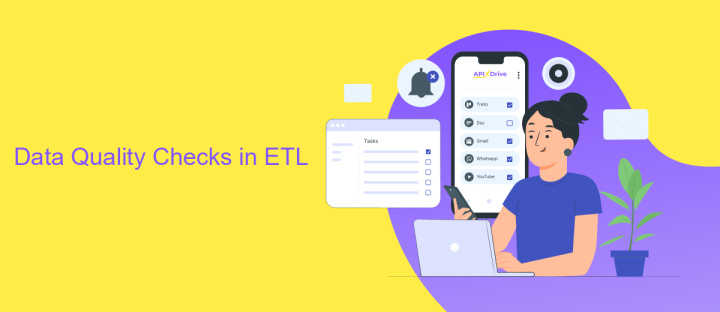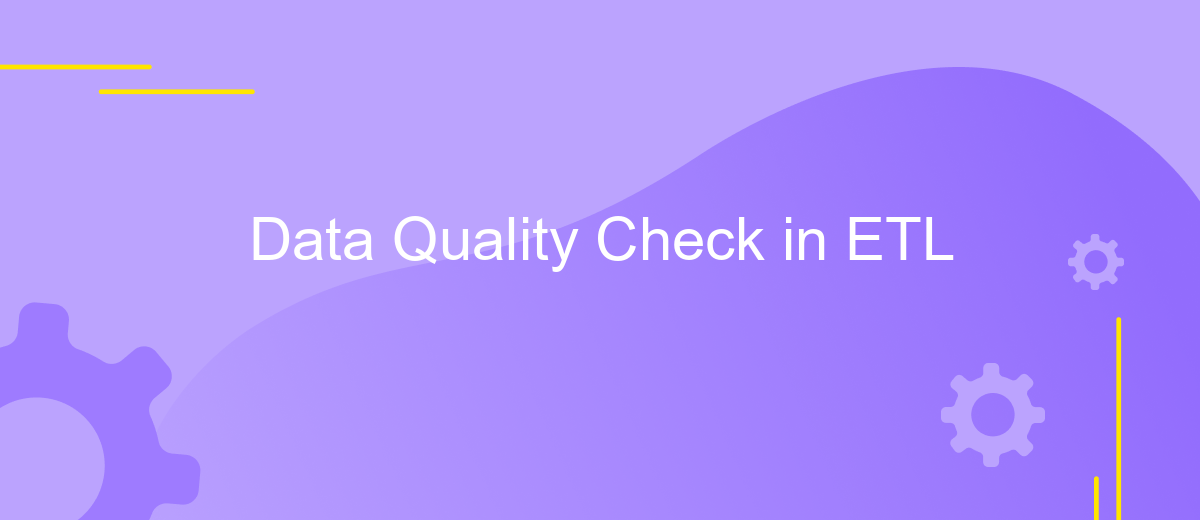Data Quality Check in ETL
Ensuring data quality is a critical aspect of any ETL (Extract, Transform, Load) process. High-quality data is essential for accurate analytics, informed decision-making, and overall business success. This article explores the importance of data quality checks in ETL, outlining key strategies and best practices to maintain data integrity and reliability throughout the data pipeline.
Introduction and Importance of Data Quality
Data quality is a critical aspect of any ETL (Extract, Transform, Load) process. Ensuring high-quality data is essential for making informed business decisions, maintaining operational efficiency, and achieving regulatory compliance. Poor data quality can lead to incorrect analysis, misguided strategies, and significant financial losses.
- Accuracy: Ensures that data is correct and free from errors.
- Completeness: Guarantees that all necessary data is available.
- Consistency: Maintains uniformity across different datasets.
- Timeliness: Ensures data is up-to-date and available when needed.
- Validity: Confirms that data conforms to the required formats and standards.
Implementing robust data quality checks in ETL processes helps in identifying and rectifying issues early. Tools like ApiX-Drive can facilitate seamless integration and automate data quality checks, ensuring that data remains accurate and reliable across various systems. By prioritizing data quality, organizations can leverage accurate insights to drive business growth and innovation.
Data Quality Checks in ETL

Data quality checks are essential in ETL (Extract, Transform, Load) processes to ensure the accuracy, consistency, and reliability of data. These checks involve validating data at various stages of the ETL pipeline, from the source through transformation and finally at the destination. Common checks include verifying data types, ensuring data completeness, and detecting duplicates. By implementing robust data quality checks, organizations can prevent erroneous data from propagating through their systems, which is crucial for making informed business decisions.
One efficient way to automate and streamline data quality checks is by leveraging integration services like ApiX-Drive. ApiX-Drive facilitates seamless data transfer and integration between various platforms, making it easier to implement real-time data validation rules. This service can automatically flag inconsistencies and trigger alerts, allowing data engineers to address issues promptly. By incorporating tools like ApiX-Drive into the ETL workflow, organizations can enhance their data quality management and ensure that their data remains accurate and trustworthy throughout its lifecycle.
Common Data Quality Issues

Data quality issues can significantly impact the accuracy and reliability of ETL processes. Identifying and addressing these issues is crucial for maintaining data integrity and ensuring that business decisions are based on accurate information.
- Incomplete Data: Missing values or incomplete records can lead to incorrect analysis and reporting.
- Duplicate Data: Redundant records can cause inconsistencies and inflate data volumes unnecessarily.
- Inconsistent Data: Variations in data formats, units, or naming conventions can hinder data integration and analysis.
- Outdated Data: Stale or obsolete data can mislead decision-making processes.
- Data Entry Errors: Human errors during data entry can result in inaccurate data.
To mitigate these common data quality issues, it is essential to implement robust data validation and cleansing procedures. Tools like ApiX-Drive can help streamline these processes by automating data integration and ensuring that data from various sources is accurate and up-to-date. Regular audits and continuous monitoring are also critical to maintaining high data quality standards.
Tools and Techniques for Data Quality Checks

Ensuring data quality in ETL processes is crucial for accurate analytics and decision-making. Various tools and techniques can be employed to maintain data integrity, consistency, and accuracy throughout the ETL pipeline.
Data profiling tools help in identifying anomalies, missing values, and inconsistencies in the data before it is loaded into the target system. These tools provide insights into the data structure and quality, enabling proactive corrections.
- Data Profiling Tools: Talend, Informatica Data Quality
- Data Validation Tools: Great Expectations, Apache Griffin
- Data Integration Services: ApiX-Drive
- Monitoring and Alerting Tools: Apache Airflow, DataDog
Using a combination of these tools ensures a robust data quality framework. For instance, ApiX-Drive facilitates seamless integration and automation, reducing manual errors and ensuring data consistency across systems. Regular monitoring and validation further enhance the reliability of the data, making it a valuable asset for any organization.


Benefits and Best Practices for Data Quality
Ensuring data quality in ETL processes is crucial for maintaining the accuracy, reliability, and usability of data. High-quality data leads to better decision-making, improved operational efficiency, and enhanced customer satisfaction. By implementing rigorous data quality checks, organizations can minimize errors, reduce the risk of data corruption, and ensure compliance with regulatory standards. This, in turn, fosters trust in data-driven insights and supports strategic business initiatives.
Adopting best practices for data quality involves several key steps. First, establish clear data quality metrics and standards to measure and monitor data integrity. Utilize automated tools and platforms like ApiX-Drive to streamline data integration and ensure seamless data flow between systems. Regularly audit and cleanse data to remove duplicates, correct inaccuracies, and fill missing values. Additionally, foster a data quality culture by training employees and encouraging accountability. By following these practices, organizations can maintain high data quality and drive better business outcomes.
FAQ
What is Data Quality Check in ETL?
Why is Data Quality Check important in ETL processes?
What are common methods for performing Data Quality Checks in ETL?
How can automation tools help in Data Quality Checks during ETL?
What are some best practices for implementing Data Quality Checks in ETL?
Apix-Drive is a simple and efficient system connector that will help you automate routine tasks and optimize business processes. You can save time and money, direct these resources to more important purposes. Test ApiX-Drive and make sure that this tool will relieve your employees and after 5 minutes of settings your business will start working faster.

